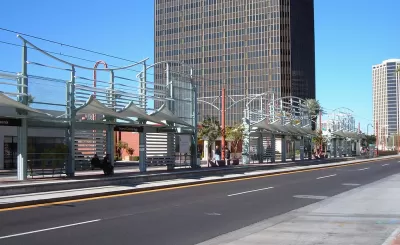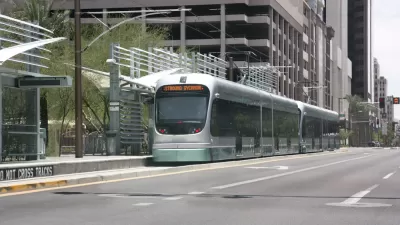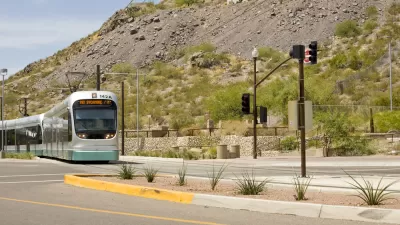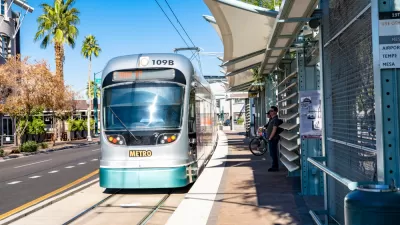Transit advocates are saying the Koch Brothers are responsible for a sudden outbreak of controversy surrounding the South Central Light Rail Extension in Phoenix.

Ahead of a critical vote on a panned light rail extension in Phoenix, Jessica Boehm reports on the financial interests behind the "grassroots" opponents and supporters of a plan to reduce the automobile lanes on Central Avenue to make room for the light rail extension.
Renewed debate over the extension began in March, when a group of south Phoenix business owners asked the council to reconfigure the project to maintain four traffic lanes on Central Avenue. The current plan would reduce the thoroughfare to two lanes.
The Phoenix City Council approved the two-lane plan in 2014 and voters approved funding for the project in 2015. But some south Phoenix residents have said they weren't aware of the lane decrease until this year.
The controversies over the lane reconfiguration has provoked a political action committee called Building a Better Phoenix to begin the process of acquiring signatures "to send back the light rail funding issue to the voters," according to Boehm. The City Council has also discussed shifting some of the funding approved by voters for transit in 2015 to street projects instead. An article by the Associated Press provides more detail about the protests that have raised the light rail plans to the level of controversial in recent months.
"At the same time, a group called Arizonans for Transportation launched a polished website and social media campaign dubbed 'Build South Central' to push back against the anti-light rail messaging," adds Boehm.
Neither organization has revealed the sources of its funding, but Angie Schmitt is willing to press further in assigning credit for Building a Better Phoenix to the Arizona Free Enterprise Institute, which is a "Koch-connected dark-money group," according to a 2o16 article by Laurie Roberts.
FULL STORY: Koch brothers? Valley Metro? Who's paying for pro- and anti-light rail campaigns?

Maui's Vacation Rental Debate Turns Ugly
Verbal attacks, misinformation campaigns and fistfights plague a high-stakes debate to convert thousands of vacation rentals into long-term housing.

Planetizen Federal Action Tracker
A weekly monitor of how Trump’s orders and actions are impacting planners and planning in America.

In Urban Planning, AI Prompting Could be the New Design Thinking
Creativity has long been key to great urban design. What if we see AI as our new creative partner?

Portland Raises Parking Fees to Pay for Street Maintenance
The city is struggling to bridge a massive budget gap at the Bureau of Transportation, which largely depleted its reserves during the Civd-19 pandemic.

Spokane Mayor Introduces Housing Reforms Package
Mayor Lisa Brown’s proposals include deferring or waiving some development fees to encourage more affordable housing development.

Houston Mayor Kills Another Bike Lane
The mayor rejected a proposed bike lane in the Montrose district in keeping with his pledge to maintain car lanes.
Urban Design for Planners 1: Software Tools
This six-course series explores essential urban design concepts using open source software and equips planners with the tools they need to participate fully in the urban design process.
Planning for Universal Design
Learn the tools for implementing Universal Design in planning regulations.
Gallatin County Department of Planning & Community Development
Heyer Gruel & Associates PA
JM Goldson LLC
City of Camden Redevelopment Agency
City of Astoria
Transportation Research & Education Center (TREC) at Portland State University
Jefferson Parish Government
Camden Redevelopment Agency
City of Claremont





























